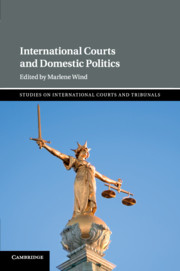Book contents
- International Courts and Domestic Politics
- Studies on International Courts and Tribunals
- International Courts and Domestic Politics
- Copyright page
- Contents
- Figures
- Tables
- Contributors
- Abbreviations
- Preface
- Introduction
- 1 ‘Missing in Action? The Rare Voice of International Courts in Domestic Politics’
- Part I
- Part II
- 8 Ideology and International Human Rights Commitments in Post-Communist Regimes: The Cases of the Czech Republic and Slovakia
- 9 Escalation and Interaction: International Courts and Domestic Politics in the Law of State Immunity
- 10 National Parliaments: Obstacles or Aid to the Impact of International Human Rights Bodies?
- 11 The European Court of Human Rights and Swiss Politics: How Does the Swiss Judge Fit In?
- 12 The Use of International Jurisprudence by Israel’s Supreme Court
- 13 Laggards or Pioneers? When Scandinavian Avant-garde Judges Do Not Cite International Case Law: A Methodological Framework
- Index
- References
8 - Ideology and International Human Rights Commitments in Post-Communist Regimes: The Cases of the Czech Republic and Slovakia
from Part II
Published online by Cambridge University Press: 23 June 2018
- International Courts and Domestic Politics
- Studies on International Courts and Tribunals
- International Courts and Domestic Politics
- Copyright page
- Contents
- Figures
- Tables
- Contributors
- Abbreviations
- Preface
- Introduction
- 1 ‘Missing in Action? The Rare Voice of International Courts in Domestic Politics’
- Part I
- Part II
- 8 Ideology and International Human Rights Commitments in Post-Communist Regimes: The Cases of the Czech Republic and Slovakia
- 9 Escalation and Interaction: International Courts and Domestic Politics in the Law of State Immunity
- 10 National Parliaments: Obstacles or Aid to the Impact of International Human Rights Bodies?
- 11 The European Court of Human Rights and Swiss Politics: How Does the Swiss Judge Fit In?
- 12 The Use of International Jurisprudence by Israel’s Supreme Court
- 13 Laggards or Pioneers? When Scandinavian Avant-garde Judges Do Not Cite International Case Law: A Methodological Framework
- Index
- References
Summary
What motivates States to commit to international human rights treaties remains an unanswered question in political science. Many tentative explanations for the observed variation in ratification patterns have been proposed; some are based on intrinsic characteristics of the treaties (the substance of the protected rights and the control mechanism); others are tied to external factors (having originated either from pressure of the international community or in the domestic political system). Yet the empirical evidence supporting the proposed hypotheses remains unsatisfactory. We aim to contribute to this discussion by providing a new systematic examination of the commitment practices in two post-communist countries: the Czech Republic and Slovakia. While both countries have experienced similar international development, propelled by the same international incentives and constraints, their internal political experience differs significantly. This case selection allows us to focus on how domestic political factors and treaty characteristics interact to determine commitment behaviour. Building upon an analysis of government’s manifestos and commitment processes in 192 treaties dealing with human rights, we examine whether Czech and Slovak governments claiming to protect certain human rights are more likely to act accordingly and aim to adopt related international human rights commitments.
- Type
- Chapter
- Information
- International Courts and Domestic Politics , pp. 181 - 205Publisher: Cambridge University PressPrint publication year: 2018



